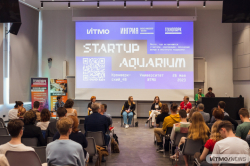Contents:
- Who are ITMO mentors?
- Why may I need a mentor?
- Who can be a mentor?
- Are experience and desire to help enough?
- Can I combine mentoring with my main job?
- What benefits will I get?
- When and how can I apply?
Who are ITMO mentors?
The practice came from IT but was adjusted for the educational field. A mentor is a personal assistant who guides and supports new employees throughout their onboarding stage, up until they pass the probation period. While leaders are responsible for introducing newcomers to their pool of duties, mentors, on the other hand, are meant to educate them more about the university’s structure and work specifics.
Mentor tasks:
-
help new members of the university team sort out organizational issues concerning salary, campus locations, departments’ responsibilities, etc.;
-
inform them about corporate events, services, and other opportunities for staff, including corporate sports, language courses, events at the art coworking space, workshops, and others;
-
provide moral support and help reduce stress (e.g., if an employee cannot find common ground with their team, experiences anxiety, or wants to know how to pass the probation period).

Illustration by Dmitry Lisovsky / ITMO.NEWS
Why may I need a mentor?
Though new employees receive a welcoming guide when they first come in, it is hardly possible for them to grasp all the things at once. All the more, after reading this voluminous document, they might have additional questions they would like to ask someone experienced. Lastly, a paper-based guide cannot support you like a mentor who will be with you from your very first days and, amidst other things, will help you deal with new job anxiety.
Who can be a mentor?
Anyone who is willing to commit their time to helping others can be a mentor. The only requirement is that candidates must have 3+ years of work experience at ITMO. Those employees who have worked less, however, can also become mentors upon a recommendation from the head of their department.

Illustration by Dmitry Lisovsky / ITMO.NEWS
Are experience and desire to help enough?
Before starting their mentor duties, all our candidates complete training where they learn more about the university, followed by a soft skill course on how to practice nonviolent communication, interact with different personality types, as well as motivate and support people.
Can I combine mentoring with my main job?
The course takes 16 academic hours and runs on Moodle and Zoom platforms, making it possible for future mentors to study at their own pace.
Having completed the course, you can mentor up to two people at once from your or any other unit. Throughout your practice, you will need to have four meetings with your mentee: one introductory meeting in their first week and three check-in meetings: in two weeks, in a month, and by the end of their probation period. Each meeting should last an hour or less and should be held at the time convenient for the mentor.

Illustration by Dmitry Lisovsky / ITMO.NEWS
What benefits will I get?
First and foremost, mentoring is an excellent way to hone your soft skills and acquire experience of working with people. All mentors are part of a club with their own community. Participants can have joint visits to Yagodnoe, study and improve their skills in communication and consulting, as well as exchange their experiences with like-minded people and learn from more experienced colleagues in a casual setting.
When and how can I apply?
You can join the mentor community at any time. All you need to do is send a request at job@itmo.ru or visit ITMO’s Center for Recruitment and Adaptation on Kronverksky Pr. 49, room 1108.





